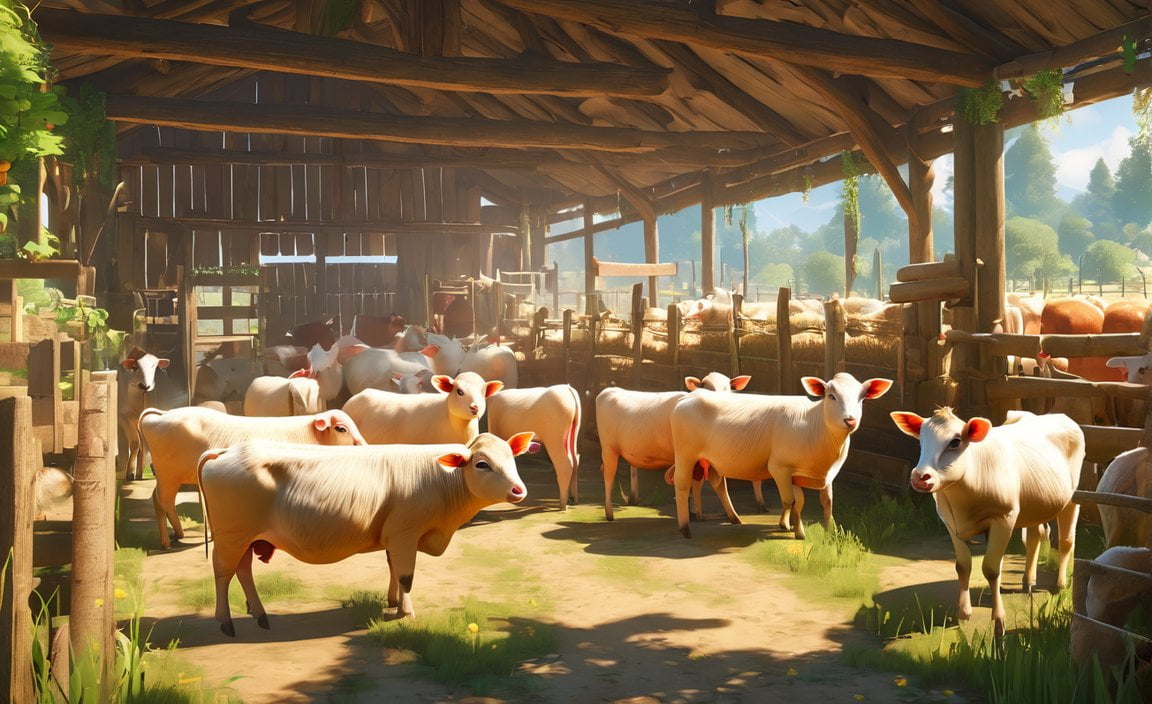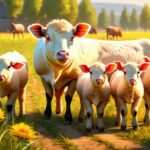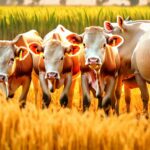Discover the countless advantages of keeping farm animals as we delve into the 10 importance factors in this article. From the economic benefits of self-sufficiency to the role of animals in sustainable agriculture, this comprehensive guide will highlight the reasons why maintaining farm animals is crucial for both individuals and communities. Whether you’re a farmer or simply interested in responsible animal welfare, join us as we explore the benefits and ethical considerations of keeping farm animals.
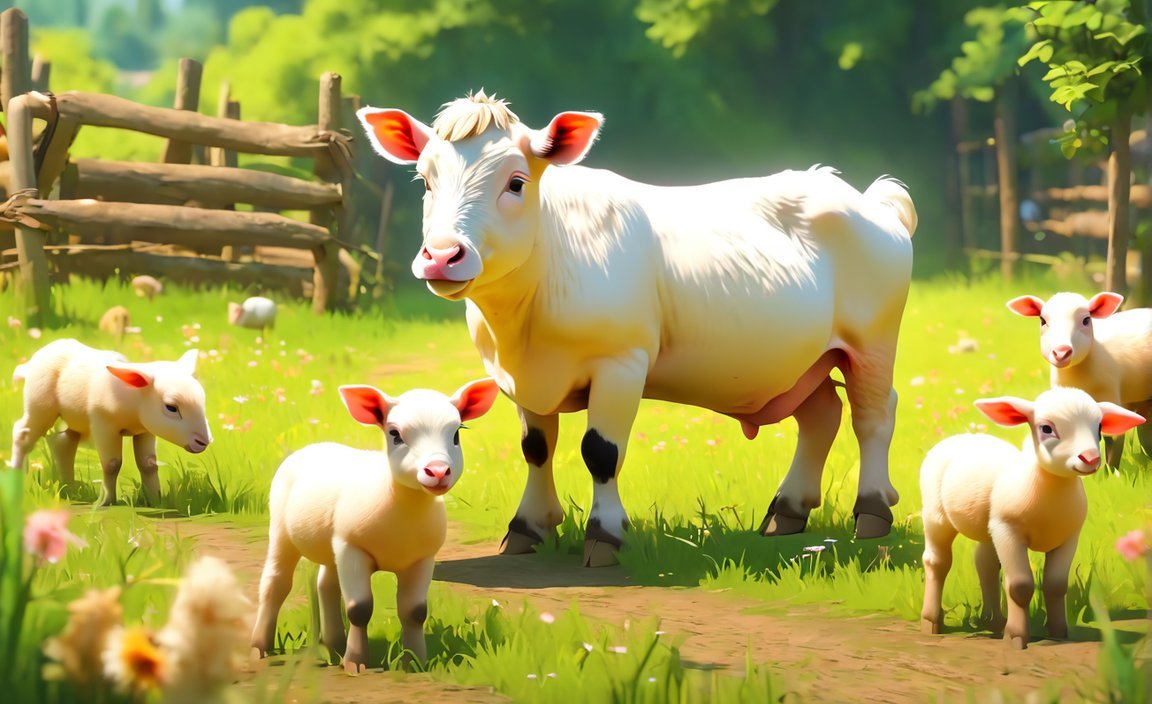
Key Takeaways:
Farm animals serve as a valuable source of protein, minerals, and vitamins, providing essential food for humans.
Certain farm animals can be used for work, assisting in farm operations and household chores.
Sheep, among other animals, contribute to the textile industry by providing wool for clothing purposes.
Guard dogs and watch animals help protect livestock and property, serving as a security measure on farms.
Animals used for sport and recreational activities promote physical fitness and entertainment.
Animal manure contains essential nutrients that enrich the soil and support sustainable agricultural practices.
Some animals have medicinal purposes and are used in the production of pharmaceutical drugs.
Various animal species provide raw materials for the production of goods, such as leather, bones, and feathers.
Certain farm animals can be utilized as feed for other livestock species, supporting efficient livestock production.
Overall, farm animals play crucial roles in supporting human life and the agricultural industry by providing food, clothing, work assistance, security, recreation, fertilizer, medicine, raw materials, and livestock feed.
10 Importance Factors of Keeping Farm Animals
Farm Animals and Their Roles in the Ecosystem
Farm animals, such as cows, sheep, goats, and chickens, play vital roles in our ecosystem. They offer various benefits that contribute to sustainable agriculture, food production, and the well-being of human communities. Let’s explore the ten key factors that highlight the importance of keeping farm animals.
1. Ensuring Food Security
One of the primary reasons for keeping farm animals is to meet the growing demand for food. Farm animals are essential for food production, providing us with a significant source of protein, minerals, and vitamins. Meat, milk, and eggs, derived from these animals, form an integral part of our diet and help ensure food security. By keeping farm animals, we can sustainably meet the nutritional needs of our population.
2. Empowering Sustainable Agriculture
Farm animals contribute to sustainable agricultural practices in several ways. Firstly, their manure is a valuable source of natural fertilizer. Animal waste contains essential nutrients that enrich the soil, promoting healthy plant growth and reducing the need for chemical fertilizers. Additionally, certain animals, like sheep and goats, play a crucial role in managing vegetation and controlling weeds. By incorporating farm animals into our farming systems, we can cultivate healthy crops while respecting the environment.
3. Facilitating Regenerative Farming
Regenerative farming focuses on revitalizing the soil and ecosystem. Farm animals significantly contribute to this approach through a process called rotational grazing. By allowing animals to graze on pasture and then moving them to fresh areas, farmers can prevent soil erosion, improve soil fertility, and restore natural biodiversity. Farm animals play a vital role in the regenerative farming movement by optimizing land use and promoting ecological balance.
4. Supporting Rural Economies
Keeping farm animals has a positive impact on local economies, particularly in rural areas. It provides income opportunities for farmers, breeders, and workers involved in animal husbandry. The livestock industry also creates jobs in related sectors such as animal feed production, equipment manufacturing, and veterinary services. By keeping farm animals, we support the economic well-being of rural communities while fostering sustainable development.
5. Enhancing Animal Welfare
Maintaining farm animals allows us to prioritize their welfare and ensure responsible and ethical treatment. With proper care, farmers can provide farm animals with appropriate living conditions, access to food and water, and veterinary attention. By keeping farm animals, we have the opportunity to promote responsible animal husbandry practices and prioritize their overall well-being.
6. Preserving Genetic Diversity
Farm animals play a crucial role in preserving genetic diversity within livestock species. By maintaining and protecting different breeds of animals, we reduce the risk of genetic impoverishment and ensure the resilience of our agricultural systems. Preserving genetic diversity is vital not only for the long-term sustainability of food production but also for safeguarding our cultural heritage and adapting to changing environmental conditions.
7. Maintaining Cultural Traditions
Farm animals are deeply rooted in cultural traditions around the world. They are symbols of agriculture, rural life, and traditional practices. By keeping farm animals, we honor and nurture these cultural traditions, preserving the heritage and knowledge associated with animal husbandry. Farm animals connect us to our roots and serve as a reminder of the importance of sustainable and responsible farming practices.
8. Promoting Education and Awareness
Keeping farm animals provides unique opportunities for education and raising awareness about agriculture and animal husbandry. Children and adults can learn about the life cycles, behaviors, and benefits of various farm animals. Farm visits, agricultural fairs, and educational programs centered around farm animals help people develop a deeper understanding of the agricultural industry and encourage sustainable practices.
9. Strengthening Community Bonds
Farm animals have a unique ability to bring communities together. They serve as conversation starters, bonding points, and sources of shared experiences. Community involvement in animal husbandry, such as communal grazing practices, can strengthen social connections and foster a sense of belonging. By keeping farm animals, we create opportunities for cooperative efforts, shared resources, and a stronger sense of community.
10. Fostering Environmental Stewardship
Farm animals contribute to environmental stewardship by facilitating sustainable farming practices. Their grazing activities can promote healthier grasslands and reduce the risk of wildfires. By integrating farm animals into agricultural systems, we encourage environmentally friendly practices, minimize chemical inputs, and increase overall sustainability. Keeping farm animals allows us to be responsible stewards of the land and promote the well-being of our planet.
In conclusion, keeping farm animals is crucial for food security, sustainable agriculture, and the overall well-being of ecosystems. These animals provide us with food, clothing materials, and solutions to environmental challenges. By recognizing the importance of farm animals and implementing responsible animal husbandry practices, we can create a harmonious relationship between humans, animals, and the environment.
References:
Farming Base. “How Do Farm Animals Help Us And What Is Their Role In The Ecosystem?” farmingbase.com
Edudelight Tutors. “Importance and Unique Benefits of Farm Animals.” edudelighttutors.com
Check out the 10 importance of animal production in agriculture. Discover how animal production plays a crucial role in the agricultural industry. Learn more
Explore the significance of farm animals in our lives and how they contribute to various aspects of agriculture. Find out
Delve into the fascinating world of rivers and understand their vital role in shaping our environment. Explore the 10 key reasons why rivers are important. Click here
Unlock the secrets behind the significance of rivers in geography. Explore how rivers influence geographical formations and landscapes in extraordinary ways. Discover more
Curious about how rivers impact humans? Dive into the 10 reasons why rivers are essential to our daily lives and discover their astounding benefits. Click here
Farm Animals Support Rural Economies and Provide Employment Opportunities
Farm animals play a vital role in supporting rural economies and creating employment opportunities. Let’s explore why keeping farm animals is of utmost importance.
Economic Impact of Farm Animals
Keeping farm animals can have a significant positive impact on rural economies. Farms that raise animals for food production stimulate the local economy by creating job opportunities in various sectors, such as agriculture, veterinary care, and food processing. These employment opportunities support the livelihoods of individuals in rural areas, contributing to economic growth and stability.
Additionally, the presence of farm animals promotes the growth of ancillary industries, including transportation, equipment manufacturing, and feed production. These industries further boost the local economy, creating a ripple effect of economic development in rural communities.
Diversification of Income Sources
Farm animals provide individuals and families in rural areas with an additional source of income. By raising and selling livestock, farmers can diversify their income streams and mitigate the risks associated with relying solely on crop production. This diversification helps rural communities withstand economic fluctuations and ensures a more stable financial future for farmers.
Empowering Sustainable Agriculture
Farm animals contribute to sustainable agriculture practices in several ways. Their manure serves as a valuable natural fertilizer, reducing the need for synthetic chemical inputs. This not only benefits the environment but also reduces costs for farmers. By recycling animal waste back into the soil, farmers can improve soil fertility, enhance crop yields, and promote overall sustainability.
Supporting Agro-Tourism and Local Businesses
Rural communities that keep farm animals often attract tourists interested in experiencing agricultural life and rural traditions. This gives rise to agro-tourism, which includes activities such as farm visits, farm stays, and agricultural festivals. Agro-tourism can provide additional revenue streams for farmers and create opportunities for local businesses, such as restaurants, bed and breakfasts, and souvenir shops. The presence of farm animals adds cultural richness to these experiences and showcases the importance of agriculture in local communities.
Animal Welfare and Ethical Considerations
In addition to the economic benefits, keeping farm animals allows for responsible and ethical treatment of animals. When farmers prioritize animal welfare, it not only benefits the animals themselves but also boosts consumer confidence in the agricultural industry. By adhering to high animal welfare standards, farmers align themselves with evolving societal values, enhancing their reputation and encouraging support from conscious consumers.
Key Takeaways:
- Keeping farm animals supports rural economies by creating employment opportunities and stimulating the local economy.
- Farm animals contribute to sustainable agriculture through their role in natural fertilizer production and soil fertility.
- Farming animals diversify income sources for rural communities, reducing dependency on crop production alone.
- The presence of farm animals can benefit local businesses through agro-tourism and agro-tourism-related industries.
- Prioritizing animal welfare enhances farm reputation and fosters consumer trust.
SOURCES:
- Grethe, H. (2017). The Economics of Farm Animal Welfare. Annual Reviews. Link
- Vigors, B., et al. (2021). The Importance of Farm Animal Health and Natural Behaviors: Stakeholder Aspirations and Attitudes to System Priorities. Frontiers in Animal Science. Link
Farm Animals: Conservation Superheroes
Farm animals play a crucial role in biodiversity conservation.
When we think of biodiversity conservation, farm animals might not be the first thing that comes to mind. But these animals are more than just a source of food or income. They are actually superheroes in the fight to preserve and restore our planet’s diverse ecosystems.
From enhancing soil fertility to supporting sustainable agriculture, farm animals contribute in numerous ways to the conservation of biodiversity. Let’s explore some key aspects of their role:
The Benefits of Farm Animals for Biodiversity Conservation
1. Fostering Soil Health and Nutrient Cycling
Farm animals, such as cows, sheep, and goats, play a vital role in regenerative agriculture by contributing to soil fertility and nutrient cycling. Through their manure, they supply valuable organic matter and nutrients to the soil. This not only enhances its productivity but also promotes the growth of diverse plant species, which in turn attracts a wide range of beneficial organisms. By nourishing the soil, farm animals create an environment where biodiversity can thrive.
2. Managing Vegetation and Restoring Biodiversity
Farm animals are expert grazers and can help manage vegetation in a way that benefits biodiversity. Through rotational grazing, they prevent overgrazing in specific areas, which allows plants to recover and encourages the growth of diverse plant communities. This, in turn, provides habitat and food for countless species, including insects, birds, and small mammals. By facilitating habitat restoration and promoting plant diversity, farm animals contribute to the overall health and stability of ecosystems.
3. Pollination and Seed Dispersal
Animals, such as bees, butterflies, and birds, play vital roles in maintaining biodiversity through pollination and seed dispersal. Farm animals can also contribute to this process. For example, chickens scratching the soil can help disperse seeds of plants, contributing to their dispersal and the regeneration of plant communities. By supporting the reproduction and dispersal of diverse plant species, farm animals indirectly contribute to the preservation of biodiversity.
4. Supporting Sustainable and Regenerative Farming Methods
One of the key principles of sustainable and regenerative farming is the integration of animals into agricultural systems. By incorporating farm animals into the farming landscape, farmers can adopt practices that work in harmony with nature. For example, incorporating livestock into crop rotations can help break pest cycles, reduce the need for chemical inputs, and enhance biodiversity. Farm animals are essential partners in promoting sustainable and regenerative farming methods that prioritize the long-term health of the environment and the well-being of farm animals.
5. Economic Impact and Community Development
Keeping farm animals not only supports the environment but also has significant economic and social benefits. Farm animals contribute to the local economy by creating jobs in agriculture, veterinary care, and food processing industries. The presence of farm animals also stimulates ancillary industries such as transportation, equipment manufacturing, and feed production. By fostering rural economies, farm animals strengthen communities, support local businesses, and contribute to the social fabric of agricultural regions.
Key Takeaways:
- Farm animals, such as cows, sheep, goats, and chickens, play a crucial role in biodiversity conservation.
- Their contributions include fostering soil health, managing vegetation, supporting pollination and seed dispersal, and enabling sustainable and regenerative farming practices.
- Farm animals have a positive economic impact by creating job opportunities, stimulating ancillary industries, and supporting community development.
Sources:
- Burbfood – Farm animals and soil fertility
- Scale Climate Action – The ecological importance of animals in maintaining biodiversity
Farm Animals: Promoting Responsible Land and Resource Management
Farm animals have a significant impact on responsible land and resource management. Their presence not only benefits the agricultural industry but also contributes to sustainable practices and the well-being of local communities. In this article, we will explore how farm animals promote responsible land and resource management, highlighting their importance and benefits.
The Benefits of Farm Animals
Farm animals play a vital role in ensuring food security, empowering sustainable agriculture, and facilitating regenerative farming practices. Let’s dive into these benefits in more detail:
1. Ensuring Food Security
Farm animals, such as cows, sheep, goats, and chickens, provide a significant source of protein, minerals, and vitamins. The [Farm animals promote responsible land and resource management] by producing valuable animal products like meat, milk, eggs, hides and skins, and animal fats that are valuable sources of high-quality nutrition for human diets.
2. Empowering Sustainable Agriculture
Farm animals contribute to sustainable agriculture through their manure, which is a valuable source of natural fertilizer. By [promoting responsible land and resource management], farm animals help enhance soil fertility, reduce the need for chemical inputs, and promote diverse plant species. They also play a crucial role in managing vegetation through grazing, preventing overgrazing, and promoting the growth of diverse plant communities that provide habitat and food for various species.
3. Facilitating Regenerative Farming
Regenerative farming practices focus on soil health, biodiversity, and carbon sequestration. Farm animals aid in regenerative farming by [promoting responsible land and resource management]. Through rotational grazing, they prevent soil erosion, improve soil fertility, and restore biodiversity. Their presence enhances the overall ecosystem and contributes to the long-term sustainability of agricultural practices.
4. Supporting Rural Economies
Keeping farm animals provides income opportunities and creates jobs in rural areas. The presence of farm animals stimulates ancillary industries such as transportation, equipment manufacturing, and feed production, resulting in economic growth. By [promoting responsible land and resource management], farm animals support local economies, foster community development, and provide additional sources of income for farmers, leading to increased financial stability and improved livelihoods.
5. Enhancing Animal Welfare
Responsible and ethical treatment of farm animals is an essential aspect of [promoting responsible land and resource management]. Farm management plays a crucial role in prioritizing animal welfare and ensuring positive experiences for animals. Positive human contact reduces animals’ fear and stress reactions, contributing to their overall well-being. By establishing mutual benefits with the livestock industry, animal welfare proponents can improve animal welfare practices and further promote responsible land and resource management.
6. Preserving Genetic Diversity
Maintaining different breeds of farm animals is essential to reduce the risk of genetic impoverishment and ensure agricultural resilience. By [promoting responsible land and resource management], farm animals contribute to preserving genetic diversity within the agricultural sector. This diversity enhances the adaptability and resilience of farming systems, making them more resistant to diseases, climate change, and other environmental challenges.
7. Maintaining Cultural Traditions
Farm animals hold deep-rooted significance in cultural traditions and symbolize agriculture and rural life. Their presence and care contribute to the preservation of cultural heritage, maintaining a connection to the land and promoting cultural identity. By [promoting responsible land and resource management], farm animals help uphold cultural traditions, fostering community bonds and ensuring the preservation of farming practices for future generations.
8. Promoting Education and Awareness
Farm animals provide educational opportunities about agriculture, sustainable practices, and the importance of responsible land and resource management. By having farm animals on agricultural properties, communities can learn about the value and benefits they bring. Through interactions with farm animals, individuals gain a deeper understanding of agriculture’s impact on the environment and the significance of sustainable farming practices.
9. Strengthening Community Bonds
Farm animals have the power to bring communities together, foster cooperation, and create a sense of belonging. Shared experiences and the care for farm animals can create strong social connections within a community. By actively [promoting responsible land and resource management] through the presence of farm animals, communities can establish a common purpose, further strengthening social bonds and supporting a collective commitment to responsible land management.
10. Fostering Environmental Stewardship
Farm animals play a significant role in sustainable land use management. Through their various contributions, such as enhancing soil health, managing vegetation, and promoting regenerative practices, farm animals [promote responsible land and resource management]. By incorporating farm animals into agricultural systems, farmers can reduce the need for chemical inputs, enhance biodiversity, and foster environmentally friendly practices, ultimately supporting the well-being of the ecosystem.
Key Takeaways:
- Farm animals are crucial for ensuring food security and agricultural sustainability.
- Their presence supports sustainable agriculture, regenerative farming, and responsible land management.
- Farm animals contribute to rural economies, creating jobs and income opportunities.
- Prioritizing animal welfare is an essential aspect of responsible land and resource management.
- Maintaining genetic diversity in farm animals promotes agricultural resilience.
- Farm animals hold cultural significance, preserving traditions and fostering community bonds.
- They provide educational opportunities about agriculture and sustainable practices.
- Farm animals aid in environmental stewardship, promoting sustainable land use and biodiversity.
Citations:
– Livestocking: 8 Importance of Farm Animals & Benefits of Raising Animals
– National Center for Biotechnology Information: Importance of Animals in Agricultural Sustainability and Food Security
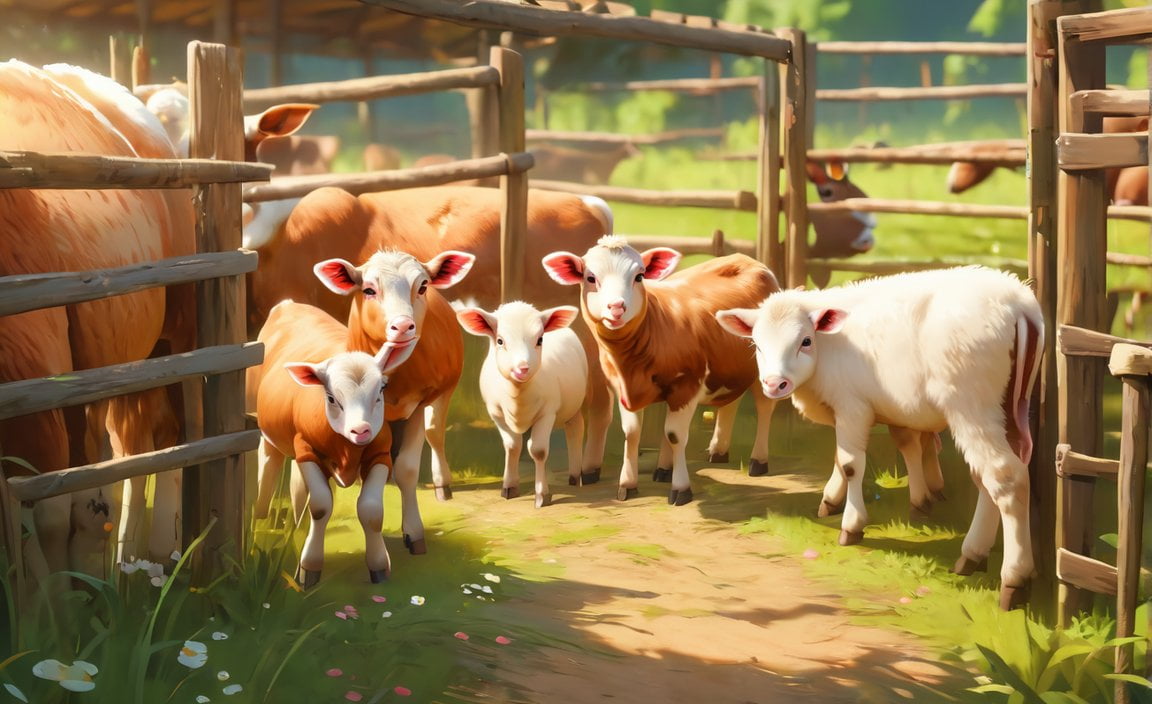
FAQ
Q1: Why are farm animals important in the ecosystem?
A1: Farm animals play various essential roles in the ecosystem, such as providing food, contributing to soil fertility through their manure, and promoting biodiversity conservation.
Q2: What are the benefits of keeping farm animals?
A2: Keeping farm animals has numerous benefits, including a significant source of protein and essential nutrients for food production, the ability to utilize them as draught animals for work purposes, and the production of raw materials like wool for clothing.
Q3: How do farm animals contribute to sustainable agricultural practices?
A3: Farm animals contribute to sustainable agriculture by providing animal manure as a natural fertilizer, enriching the soil and stimulating plant growth. They also support efficient livestock production by being utilized as feed resources for other livestock species.
Q4: Are there any economic benefits to keeping farm animals?
A4: Yes, there are economic benefits to keeping farm animals. For example, the wool market plays a significant role in the textile industry, and certain animal species provide raw materials for the production of goods such as leather, bones, and feathers.
Q5: What is the significance of farm animal welfare?
A5: Farm animal welfare is crucial for ensuring responsible animal care and promoting sustainable agricultural practices. Positive human contact and improved welfare can reduce the animals’ fear and stress reactions, resulting in a better quality of life for the animals.
- Star Ring Trends: Etsy vs Amazon - March 28, 2025
- Boost Pollinator Habitats: Baby Blue Eyes Sustainable Farming Guide - March 28, 2025
- Protect Big Black Bears: Effective Conservation Strategies - March 28, 2025
